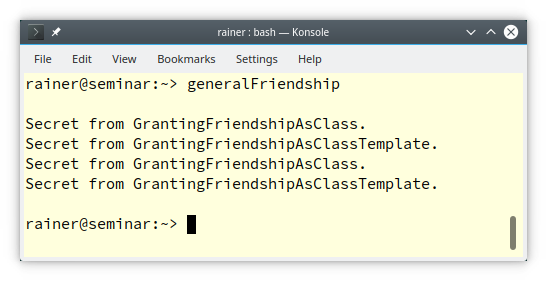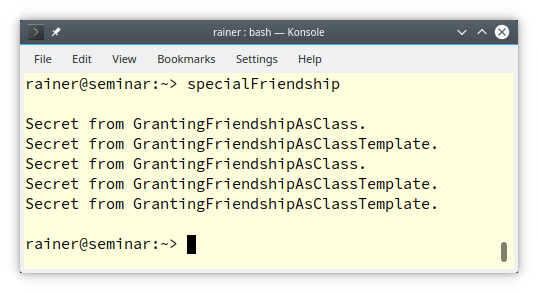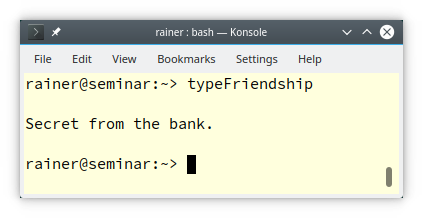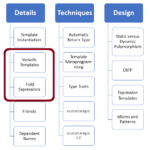The Special Friendship of Templates
A friend has unrestricted access to the members of a class. Consequently, friendship should be given wisely. Regarding templates, friendship is special.

Before I write about the friendship rules for templates, I want to present the general rules about friendship.
- The friend declaration can be made in any place in the class.
- For friendship, access rights in the class are not considered.
- Friendship is not inherited. When a class grants friendship to a class Derived, a
Derivedderived class is not automatically a friend to Base. - Friendship is not transitive. When class
Bis a friend of class A and ClassCis a friend of classB, classCis not automatically a friend of classA.
A class or a class template can have a friendship to class or class templates, function or function templates, or types.
General Friendship
A class or a class template can grant friendship to each instance of a class template or a function template.
// generalFriendship.cpp #include <iostream> template <typename T> // (1) void myFriendFunction(T); template <typename U> // (2) class MyFriend; class GrantingFriendshipAsClass { template <typename U> friend void myFriendFunction(U); template <typename U> friend class MyFriend; std::string secret{"Secret from GrantingFriendshipAsClass."}; }; template <typename T> class GrantingFriendshipAsClassTemplate{ template <typename U> friend void myFriendFunction(U); template <typename U> friend class MyFriend; std::string secret{"Secret from GrantingFriendshipAsClassTemplate."}; }; template <typename T> // (3) void myFriendFunction(T){ GrantingFriendshipAsClass myFriend; std::cout << myFriend.secret << '\n'; GrantingFriendshipAsClassTemplate<double> myFriend1; std::cout << myFriend1.secret << '\n'; } template <typename T> // (4) class MyFriend{ public: MyFriend(){ GrantingFriendshipAsClass myFriend; std::cout << myFriend.secret << '\n'; GrantingFriendshipAsClassTemplate<T> myFriend1; std::cout << myFriend1.secret << '\n'; } }; int main(){ std::cout << '\n'; int a{2011}; myFriendFunction(a); MyFriend<double> myFriend; std::cout << '\n'; }
Line (1) and line (2) forward declare the function template myFriendFunction and the class template MyFriend. The function template myFriendFunction is defined in line (3), and the class template MyFriend in line (4). The classes GrantingFriendshipAsClass and GrantingFriendshipAsClassTemplate grant the function template myFriendFunction and the class template MyFriend friendship. Due to the friendship, both templates can directly invoke the private member secrete of the class and the class template.

There is a pitfall involved in the class template GrantingFriendShipAsClassTemplate. Usually, you call the first type parameter of a template T. An error occurs when you use – such as in the following code snippet – the same type parameter name for the class template and the function template
or the class template. The name T of myFriendFunction or MyFriend shadows the name T of the class template GrantingFriendshipAsClassTemplate.
The following code snippet displays the pitfall.
 Modernes C++ Mentoring
Modernes C++ Mentoring
Do you want to stay informed: Subscribe.
template <typename T> class GrantingFriendshipAsClassTemplate{ template <typename T> friend void myFriendFunction(T); template <typename T> friend class MyFriend; std::string secret{"Secret from GrantingFriendshipAsClassTemplate."}; };
Special Friendship
A special friendship is a friendship that depends on the type of template parameter.
// specialFriendship.cpp #include <iostream> template <typename T> void myFriendFunction(T); template <typename U> class MyFriend; class GrantingFriendshipAsClass { friend void myFriendFunction<>(int); // (1) friend class MyFriend<int>; // (2) private: std::string secret{"Secret from GrantingFriendshipAsClass."}; }; template <typename T> class GrantingFriendshipAsClassTemplate { friend void myFriendFunction<>(int); friend class MyFriend<int>; friend class MyFriend<T>; // (3) private: std::string secret{"Secret from GrantingFriendshipAsClassTemplate."}; }; template <typename T> void myFriendFunction(T) { GrantingFriendshipAsClass myFriend; std::cout << myFriend.secret << '\n'; // (4) GrantingFriendshipAsClassTemplate<T> myFriend1; std::cout << myFriend1.secret << '\n'; // (5) } template <typename T> // (6) class MyFriend { public: MyFriend() { GrantingFriendshipAsClass myFriend; std::cout << myFriend.secret << '\n'; GrantingFriendshipAsClassTemplate<int> myFriendInt; std::cout << myFriendInt.secret << '\n'; GrantingFriendshipAsClassTemplate<T> myFriendT; std::cout << myFriendT.secret << '\n'; } }; int main() { std::cout << '\n'; int a{2011}; myFriendFunction(a); MyFriend<int> myFriend; std::cout << '\n'; }
The class GrantingFriendshipAsClass grants friendship to the full specialization of the function template myFriendFunction for int (line 1) and the class template MyFriend for int (line 2). The same holds for the class template GrantingFrandshipAsClassTemplate. Lines (3) is unique because it grants friendship to the full specialization for MyFriend having the same type parameter as the class template GrantingFrandshipAsClassTemplate. Consequently, the function template myFriendFunction can invoke the secret of the class GrantingFriendshipAsClass when myFriendFunctions is a full specialization for int (line 4) or GrantingFriendshipAsClassTemplate has the same type, such as myFriendFunction (line 5). The corresponding argumentation holds for the class template MyFriend (line 6).

Friend to Types
A class template can also grant its friendship to a type parameter.
// typeFriendship.cpp #include <iostream> template <typename T> class Bank { std::string secret{"Secret from the bank."}; friend T; }; class Account{ public: Account() { Bank<Account> bank; std::cout << bank.secret << '\n'; // (1) } }; int main(){ std::cout << '\n'; Account acc; std::cout << '\n'; }
The class Bank grants friendship to its type parameter T. Consequently, an Account can access the secret of the bank instantiation for Account: Bank<Account> (line 1).

What’s next?
In my next post, I will write about dependent names, one of the more complicated corners of templates.
Thanks a lot to my Patreon Supporters: Matt Braun, Roman Postanciuc, Tobias Zindl, G Prvulovic, Reinhold Dröge, Abernitzke, Frank Grimm, Sakib, Broeserl, António Pina, Sergey Agafyin, Андрей Бурмистров, Jake, GS, Lawton Shoemake, Jozo Leko, John Breland, Venkat Nandam, Jose Francisco, Douglas Tinkham, Kuchlong Kuchlong, Robert Blanch, Truels Wissneth, Mario Luoni, Friedrich Huber, lennonli, Pramod Tikare Muralidhara, Peter Ware, Daniel Hufschläger, Alessandro Pezzato, Bob Perry, Satish Vangipuram, Andi Ireland, Richard Ohnemus, Michael Dunsky, Leo Goodstadt, John Wiederhirn, Yacob Cohen-Arazi, Florian Tischler, Robin Furness, Michael Young, Holger Detering, Bernd Mühlhaus, Stephen Kelley, Kyle Dean, Tusar Palauri, Juan Dent, George Liao, Daniel Ceperley, Jon T Hess, Stephen Totten, Wolfgang Fütterer, Matthias Grün, Ben Atakora, Ann Shatoff, Rob North, Bhavith C Achar, Marco Parri Empoli, Philipp Lenk, Charles-Jianye Chen, Keith Jeffery, Matt Godbolt, Honey Sukesan, bruce_lee_wayne, Silviu Ardelean, schnapper79, Seeker, and Sundareswaran Senthilvel.
Thanks, in particular, to Jon Hess, Lakshman, Christian Wittenhorst, Sherhy Pyton, Dendi Suhubdy, Sudhakar Belagurusamy, Richard Sargeant, Rusty Fleming, John Nebel, Mipko, Alicja Kaminska, Slavko Radman, and David Poole.
| My special thanks to Embarcadero |  |
| My special thanks to PVS-Studio |  |
| My special thanks to Tipi.build |  |
| My special thanks to Take Up Code |  |
| My special thanks to SHAVEDYAKS |  |
Modernes C++ GmbH
Modernes C++ Mentoring (English)
Rainer Grimm
Yalovastraße 20
72108 Rottenburg
Mail: schulung@ModernesCpp.de
Mentoring: www.ModernesCpp.org




Leave a Reply
Want to join the discussion?Feel free to contribute!